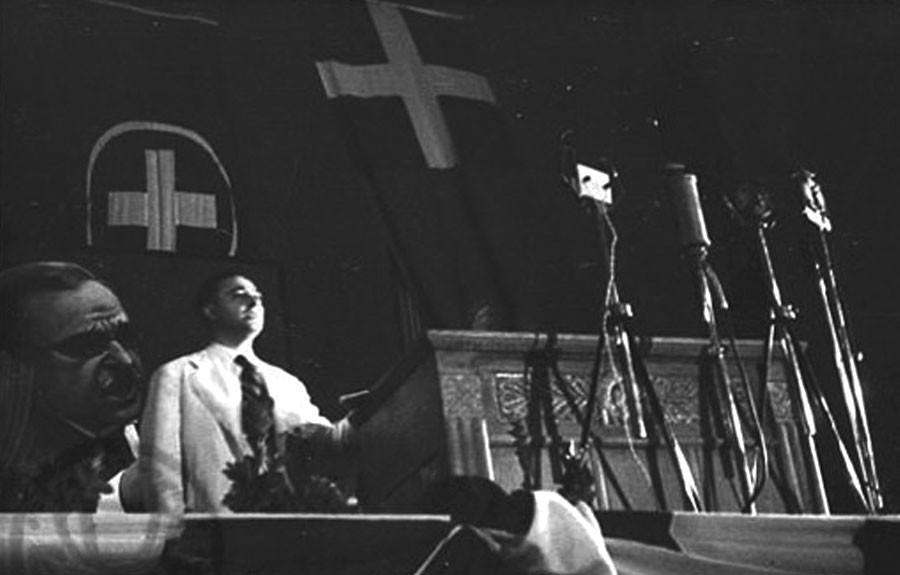
Theologos Nikoloudis (Θεολόγος Νικολούδης), the Greek Goebbels
Theologos Nikoloudis (Θεολόγος Νικολούδης) was a Greek journalist and politician, more known as the Greek sub-minister of Press and Tourism (Yfipourgeio Typou kai Tourismou, YTT, Υφυπουργειο Τύπου και Τουρισμού), which despite its modest name was a fully operating ministry of propaganda during the 4th of August regime leaded by General Ioannis Metaxas.
Nikoloudis had been born in Leros, located in the Dodecanese islands, in 1890. He first studied in Syros and then moved to Cairo, Egypt, where a thriving Greek community existed (one of the members of this community would be the maternal grandmother of Rudolf Hess). There he studied a commercial-oriented career as a bank clerk but cultivated a keen interest in journalism and he began working in newspapers and magazines in Alexandria.
After moving back to Athens, in 1914 he published a literary work. In 1917, in collaboration with S. Alimpertis he founded the newspaper Politeia, which he continued to issue until 1929. He joined forces with Ioannis Metaxas’ political party, the Eleftherofrones, and became elected deputy at the Greek Parliament. In 1927, Nikoloudis undertook Minister of Education in the coalition government of Alexander Zaimis. In 1931 he re-issued his newspaper Politeia.
In 1936, after the declaration of the Metaxas dictatorship on August 4, 1936, Theologos Nikoloudis headed the sub-ministry of Press and Tourism, with jurisdiction over newspapers, magazines, books and paperwork in general, theatrical and cinema exhibits, lectures and seminars, gramophone recordings and radio programs.
As the Greek minister of propaganda, he was bynamed by his opponents ‘the Greek Goebbels’ and, in fact, he met Josef Goebbels in Athens during the visit of the German Propaganda Minister to Greece, 20-29 September 1936. From his ministry, he helped convey the virtues of the 4th of August state among the Greek society, issued anti-Communist propaganda, shaped Ioannis Metaxas’ image as the ‘Archigos’ and built his image as ‘the First Peasant’, ‘the First Worker’, ‘the First Soldier’.
In fact, his ministry served as a platform for propagating the ideology of the Fourth of August regime. Nikoloudis was the founder of the monthly periodical “To Neon Kratos”, which was intended to provide a forum for intellectuals to debate Fourth of August solutions to the problems of modernity facing Greece. He also created a number of the symbols and slogans which bore a strong resemblance to similar propaganda tools used by the Nazis in Germany and the Fascists in Italy.
Beyond propaganda, Nikoloudis also applied a strict censorship (except for books and magazines coming from Nazi Germany). He did not hesitate to censor, among many other texts, Sophocles’ Antigone, works by Aristophanes, Pericles’ Funeral Oration by Thucydides, and writings by the super-nationalist P. Giannopoulos; and the regime twice included among its ‘urban shows’ the public burning of 445 censored books, in Piraeus and in Sparta. He also adopted some measures to boost tourism, especially for internal consumption among Greeks but also for foreigners.
Nikoloudis retained his position as Propaganda minister until the end of the 4th of August regime in April 1941, when the Germans entered Athens. Then he fled together with an exiled government headed by a new Prime Minister, Emmanouel Tsouderos, to Egypt, a country he knew well as he had lived there in his youth. The exiled government maintained most of the structures of the 4th of August State, and Nikoloudis kept his place as minister at the sub-ministry of Press and Tourism in the exiled Tsouderos government.
However, a few weeks later he resigned because of a dispute with Tsouderos, and in August 1941 he was appointed ambassador in Pretoria (modern-day South Africa), but his relationship with the exiled government continued to be tense and in November 1942 he was forced to resign as an ambassador after making declarations in which he praised the Metaxas regime.
In 1945, he wrote a book called ‘The Greek crisis’, where he argued that had Ioannis Metaxas not died in January 1941, the Greek Army would have resisted the German invasion for a much longer time, and the result of the Greek-German conflict would have been different.
After the war, he returned to Athens, where he died in 1946.
By Andreas Markessinis
Mention: » The Ideology of the Metaxas Regime | METAXAS PROJECT | Ioannis (John) Metaxas
Mention: » Charaktiristika kai ergo tou Kathestotos ths 4is Avgoustou | METAXAS PROJECT | Ioannis (John) Metaxas
Mention: » Selected quotes by Ioannis Metaxas | METAXAS PROJECT | Ioannis (John) Metaxas
Mention: » Χαρακτηριστικά και έργο του καθεστώτος της 4ης Αυγούστου | METAXAS PROJECT | Ioannis (John) Metaxas
Mention: » Χαρακτηριστικά και έργο του καθεστώτος της 4ης Αυγούστου | METAXAS PROJECT | Ioannis (John) Metaxas
Mention: » Konstantinos Maniadakis, the Greek Himmler | METAXAS PROJECT | Ioannis (John) Metaxas
Mention: » Nelly’s // Ioannis (John) Metaxas // Ιωάννης Μεταξάς
Mention: From Metaxas to Tsolakoglou: From dictatorship to collaborationism | Metaxas Project